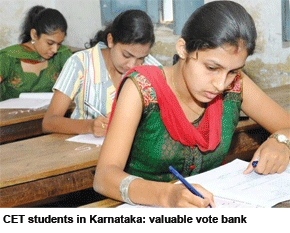Karnataka: Temporary truce
The near absolute majority won by the Congress party in the Karnataka state legislative election of May 5 has been cautiously welcomed by the state’s citizens thoroughly disillusioned with its predecessor scams-tainted BJP government which (mis)ruled the state for five years (2009-2013). K. Siddaramaiah, a political veteran known for his ‘clean image’, was sworn in as chief minister amid great expectations at a ceremony attended by over 50,000 people in Bangalore on May 13.
One of the first challenges before the chief minister was to renew or repudiate a consensual seat-sharing agreement signed annually between the state government and Consortium of Medical, Engineering and Dental Colleges-Karnataka (COMED-K), which represents the state’s 187 private unaided professional education (engineering, medical etc) colleges. Every year, private professional colleges and the state government wrangle over the quota of seats in private colleges to be allotted to students topping the state government’s common entrance test (CET) and special subsidised tuition fees payable by them.
 At a meeting held on May 24 between COMED-K representatives and the new Congress government, the latter won a minor victory by browbeating private college managements to retain last year’s tuition fees structure and seat sharing matrix. As per the agreement, in the new academic year commencing in August, 45 percent of the intake capacity of engineering, 40 percent of medical and 25 percent of dental in the state’s 187 private professional education colleges will be allotted to CET 2013 exam toppers at government prescribed annual fees — engineering (Rs.35,000); medical (Rs.46,000) and dental (Rs.35,000). Against this, other students will pay tuition fees ranging from Rs.1.25-3.52 lakh per year.
At a meeting held on May 24 between COMED-K representatives and the new Congress government, the latter won a minor victory by browbeating private college managements to retain last year’s tuition fees structure and seat sharing matrix. As per the agreement, in the new academic year commencing in August, 45 percent of the intake capacity of engineering, 40 percent of medical and 25 percent of dental in the state’s 187 private professional education colleges will be allotted to CET 2013 exam toppers at government prescribed annual fees — engineering (Rs.35,000); medical (Rs.46,000) and dental (Rs.35,000). Against this, other students will pay tuition fees ranging from Rs.1.25-3.52 lakh per year.
Comed-K, which has been demanding a 30 percent hike in the tuition fees paid by government quota students, opted to agree when it was threatened with implementation of the Karnataka Professional Educational Institutions (Regulation of Admission and Determination of Fee) Act, 2006 (KPEI), which mandates reservation of 50 percent of capacity in private professional colleges for SCs, STs and OBCs, and determination of tuition fees by a committee headed by a retired high court judge. “We are giving an option to private colleges to either follow the consensual agreement or agree to implementation of the Karnataka Professional Educational Institutions Act, 2006,” chief minister K. Siddaramaiah told the media on May 22.
Confronted with the implementation of the cold-storaged 2006 legislation, private professional college managements opted for the lesser evil of the consensual agreement, in consideration of which the state government called off implementation of the Act for another year.
Unsurprisingly, there’s considerable heartburn within private professional colleges that despite three Supreme Court judgements (T.M.A. Pai Foundation (2002), Islamic Academy (2003) and P.A. Inamdar vs. State of Maharashtra (2005)) upholding the right of private self-financed professional colleges to determine their own “reasonable’’ tuition fees and transparent admission processes, the state government continues to arm-twist them to allocate upto 45 percent of capacity to “merit’’ students topping CET, at subsidised fees.
Comments Dr. S. Kumar, secretary of COMED-K: “Successive court judgements have given private professional colleges the right to determine their own admission processes and fees structures, but state governments refuse to respect them. Instead year after year we are forced to accept this crosssubsidy scheme under which almost half the students pay not even 15 percent of the actual cost of education provision. For instance for the MBBS programme, CET students pay a mere Rs.46,000 per year against the Rs.3.52 lakh paid by other students. This is unfair to private colleges who are expected to provide high-quality education with half the students paying almost nothing. Obviously political parties are interested in populism rather than enabling provision of high-quality education which comes at a price.”
According to Dr. Kumar, president (medical education) of the Gokula Education Foundation which runs the top-ranked M.S. Ramaiah Medical College in Bangalore, next year COMED-K will take its chances with the KPEI Act, 2006 which stipulates formation of a fees fixation committee. The Act prescribes a differential fee structure for each private professional college depending on factors such as location, investment in infrastructure and study programmes. “We cannot continue with this discriminatory fee structure and will press for implementation of the KPEI Act next year. Under the Act the fees fixation committee has to stipulate a uniform fee for all students enrolled in a private professional college. We don’t mind reserving 50 percent of seats for backward communities as long as all students pay a uniform fee. In the event that the committee’s fees structure is not acceptable, we will again have to go to court,” says Kumar.
Quite obviously the May 24 agreement between the state government and COMED-K is a temporary truce. Next year the drama will be enacted again. And given that for the state government provision of professional education at subsidised tuition fees in private colleges is crucial to preservation of middle class vote bank, it’s unlikely it will give in without a fight.
Summiya Yasmeen (Bangalore)















Add comment